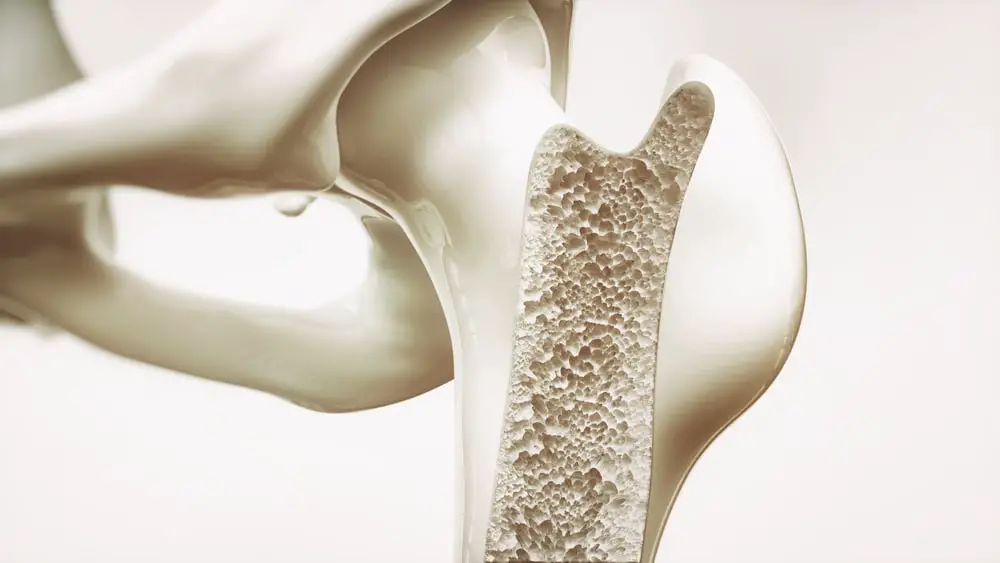Are you concerned about your bone health and looking for natural ways to maintain strong and resilient bones? Recent alarming statistics indicate that osteoporosis affects over 200 million people worldwide, leading to an increased risk of fractures and compromised quality of life. [1]
While calcium has long been touted as the cornerstone of bone health, emerging scientific studies reveal the vital role of other nutrients found abundantly in plant-based foods. Contrary to common belief, plant-based sources can be even more beneficial for bone health than dairy products or calcium supplements.
In this comprehensive article, we will explore five essential nutrients for strong bones, their plant-based sources, and the myriad health advantages that a plant-centric diet offers.
Vital Vitamins and Minerals for Bone Health
To ensure your bones remain robust and resilient throughout life, it is essential to provide them with the right nutrients. Let’s dive in and discover the vital nutrients that can safeguard your skeletal strength and enhance your overall quality of life.
1. Calcium
Calcium is a primary building block of bone tissue and is crucial in maintaining bone strength and density. While dairy products are often associated with calcium, numerous plant-based sources provide this essential nutrient.
One cup of cooked collard greens, for instance, contains as much calcium as a cup of milk. Moreover, studies show that consuming calcium-rich plant foods contributes to improved bone health and a reduced risk of fractures. [2,3]
2. Magnesium:
Magnesium is an unsung hero in bone health, as it supports calcium absorption and utilization within the bones. Interestingly, approximately 80% of the population is deficient in magnesium, emphasizing the importance of incorporating magnesium-rich plant foods into your diet. Foods like pumpkin seeds, almonds, and spinach are excellent sources of this essential mineral. [4]
3. Potassium:
Potassium plays a critical role in neutralizing acids in the body, protecting bones from demineralization. A diet rich in potassium has been associated with enhanced bone strength and density. Bananas, sweet potatoes, and avocados are fantastic potassium-rich options that can benefit bone health. [5]
4. Vitamin C:
Vitamin C is a powerful antioxidant that stimulates collagen production, a key component of bone tissue. Including vitamin C-rich plant foods in your diet supports bone repair and growth. Berries, citrus fruits, and bell peppers are excellent sources of this essential vitamin. [6]
5. Vitamin K2:
Research has demonstrated that vitamin K2 is instrumental in bone formation and mineralization, and a deficiency can weaken bones and increase the risk of fractures. Incorporating leafy greens like kale and spinach into your meals provides ample vitamin K to support bone health. [7]

Foods to Avoid: The Culprits Behind Weak Bones
While focusing on bone-nourishing plant-based foods, it’s essential to be mindful of foods that may hinder nutrient absorption or impact bone health negatively.
- High-Phytate Foods: Phytate found in certain plant-based foods can reduce mineral absorption, including calcium, potentially impacting bone health. These include whole wheat, bran, beans, and lentils.
- High-Oxalate Foods: Foods rich in oxalates can hinder calcium absorption and may affect bone health if not balanced with other calcium sources. Examples include spinach, beet greens, and Swiss chard.
- Salty Snacks and Processed Foods: Excessive sodium intake can increase calcium excretion in urine, contributing to bone loss over time. Limit or avoid chips, pretzels, canned soups, and processed frozen meals.
- Caffeine-Rich Drinks: Consuming too much caffeine can also lead to calcium loss in urine. Avoid sodas and energy drinks, and consume coffee and tea in healthy moderation.
- Excessive Alcohol: Heavy alcohol consumption interferes with calcium absorption, hinders bone formation, and elevates the risk of fractures.
The Bountiful Benefits of Plant-Based Foods:
Plant-based foods offer many health benefits beyond their impact on bone health. Here are some additional benefits of incorporating plant-based foods into your diet:
- Heart Health: Plant-based diets are associated with a reduced risk of heart disease. They tend to be lower in saturated fats and cholesterol and higher in heart-healthy fiber, antioxidants, and phytochemicals, which promote cardiovascular health.
- Lower Risk of Chronic Diseases: Plant-based diets have been linked to a reduced risk of chronic conditions such as type 2 diabetes, certain cancers, and hypertension.
- Digestive Health: Plant-based foods are rich in dietary fiber, which promotes healthy digestion and helps prevent constipation. A diet high in fruits, vegetables, and whole grains supports a diverse and healthy gut microbiome.
- Immune Function: Plant-based diets are typically rich in vitamins, minerals, and antioxidants that support a strong immune system, helping the body defend against infections and illnesses.
- Increased Energy Levels: Plant-based diets can provide a steady source of energy due to their nutrient-dense nature. They are also less likely to cause energy spikes and crashes that may be associated with high-sugar or processed foods.

My Personal RX for Diverse Nutrition and Vibrant Health
In a nutshell, my advice to everyone out there is to embrace the beauty of a diverse diet. Try new foods, get creative in the kitchen, and explore the rainbow of flavors and textures that Mother Nature has to offer. Here’s my personalized health prescription to maintain vibrance in your life and well-being.
- Go Rainbow Shopping: Aim to fill your grocery cart with fruits and vegetables of different colors to ensure a wide range of vitamins, minerals, and antioxidants.
- Explore Ethnically Diverse Cuisines: Try foods from various cultures and regions to expand your palate and nutrient intake. Embrace flavors from Asian, African, Mediterranean, and South American cuisines, among others.
- Spice Up Your Life: Experiment with various herbs and spices, such as turmeric, ginger, and cinnamon, which not only add flavor but also offer numerous health benefits.
- Get Sunlight Vitamin: Get some sun exposure in the early morning or late afternoon to boost your body’s natural production of vitamin D, which is essential for calcium absorption and bone health.
- Embrace Holistic Wellness: Download my 50-page Protocol for Optimizing Your Health and Wellbeing to discover the unique holistic approach that could be a game-changer for your health and help you create significant lasting change in your life.
- Take Charge of Your Bone Health: OsteoProtect promotes healthy bone density, increases skeletal strength, and improves bone remodeling by combining key vitamins, minerals, and trace elements supporting bone formation and connective tissue health.
With osteoporosis and bone-related issues becoming increasingly prevalent, the importance of a well-balanced and nutrient-rich diet for bone health cannot be overstated. By embracing a plant-centric diet and focusing on calcium, magnesium, potassium, vitamin C, and vitamin K-rich plant-based foods, you can fortify your bones and enjoy a host of other health benefits.
Remember, your body is like a well-tuned machine that thrives on the goodness of a diverse diet. So, let’s nourish ourselves from the inside out and live life to the fullest!
This is why I recommend OsteoProtect to my patients:
References:
- Sozen, T., Özışık, L., & Başaran, N. Ç. (2017). An overview and management of osteoporosis. European Journal of Rheumatology, 4(1), 46–56. https://doi.org/10.5152/eurjrheum.2016.048
- UCSF Health. (2022). Calcium content of foods. ucsfhealth.org. https://www.ucsfhealth.org/education/calcium-content-of-foods
- UCSF Health. (2022b). Calcium content of foods. ucsfhealth.org. https://www.ucsfhealth.org/education/calcium-content-of-foods
- Office of Dietary Supplements – magnesium. (n.d.-b). https://ods.od.nih.gov/factsheets/Magnesium-healthProfessional/
- Potassium salts aid bone health, limit osteoporosis risk, new research finds. (2015, January 15). ScienceDaily. https://www.sciencedaily.com/releases/2015/01/150114115340.htm
- Slemenda, C. W., Peacock, M., Hui, S. L., Zhou, L., & Johnston, C. C. (1997). Reduced Rates of Skeletal Remodeling Are Associated with Increased Bone Mineral Density During the Development of Peak Skeletal Mass. Journal of Bone and Mineral Research, 12(4), 676–682. https://doi.org/10.1359/jbmr.1997.12.4.676
- Akbari, S., & Rasouli-Ghahroudi, A. A. (2018). Vitamin K and bone Metabolism: A review of the latest evidence in preclinical studies. BioMed Research International, 2018, 1–8. https://doi.org/10.1155/2018/4629383




















